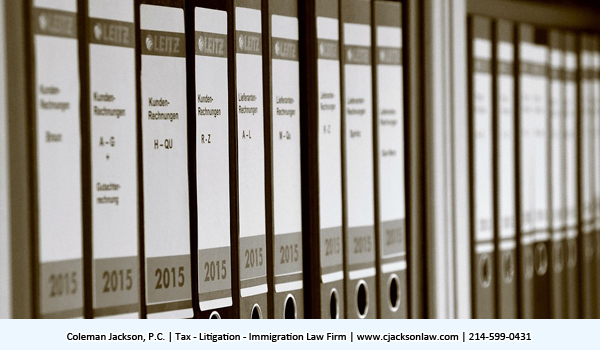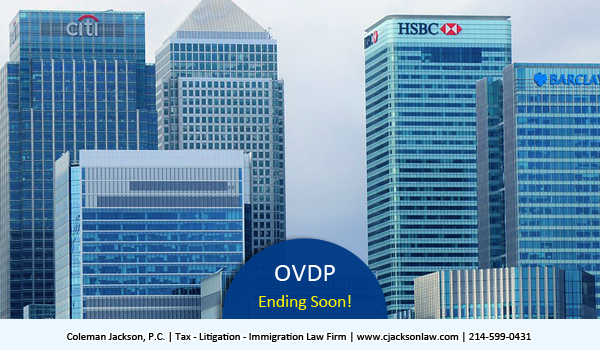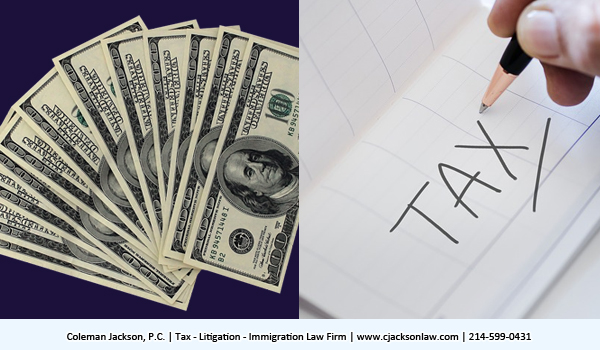Coleman Jackson, P.C. | Transcript of Legal Thoughts Podcast
Published March 10, 2021.

Legal Thoughts is a podcast presentation by Coleman Jackson, P.C., a law firm based in Dallas, Texas serving individuals, businesses, and agencies from around the world in taxation, litigation and immigration legal matters.
This particular episode of Legal Thoughts is a podcast where the Attorney, Coleman Jackson is being interviewed by Reyna Munoz, Immigration Legal Assistant of Coleman Jackson, P.C. The topic of discussion is ““Here’s why people filing taxes should be careful when selecting a professional tax return preparer.” You can listen to this podcast by clicking here:
You can also listen to this episode and subscribe to Coleman Jackson, P.C.’s Legal Thoughts podcast on Apple Podcast, Google Podcast, Spotify, Cashbox or wherever you may listen to your podcast.
TRANSCRIPT:
ATTORNEY: Coleman Jackson
Legal Thoughts
COLEMAN JACKSON, ATTORNEY & COUNSELOR AT LAW
ATTORNEY: Coleman Jackson
Welcome to Tax Thoughts
- My name is Coleman Jackson and I am an attorney at Coleman Jackson, P.C., a taxation, litigation and immigration law firm based in Dallas, Texas.
- Our topic for today is: “Here’s why people filing taxes should be careful when selecting a professional tax return preparer.”
- Other members of Coleman Jackson, P.C. are Yulissa Molina, Tax Legal Assistant, Leiliane Godeiro, Litigation Legal Assistant, Reyna Munoz, Immigration Legal Assistant and Mayra Torres, Public Relations Associate.
- On this “Legal Thoughts” podcast our public relations associate, Mayra Torres will be asking the questions and I will be responding to her questions on this important tax topic: Here’s why people filing taxes should be careful when selecting a professional tax return preparer.”
Interviewer: Mayra Torres, Public Relations Associate
- Good morning everyone. My name is Mayra Torres and I am the public relations associate at Coleman Jackson, P.C. Coleman Jackson, P.C. is a law firm based right here in Dallas Texas representing clients from around the world in taxation, litigation and immigration law.
- Attorney today we are discussing a very important tax topic because filing taxes is on folks minds these days. Many people may be filing taxes for the first time this year because of the recovery rebate credit issues involving their economic impact payments and other Covid-19 relief received during 2020.
- In this Podcast, we will be discussing the safest, easiest and perhaps cheapest way folks can file their tax returns.
Question 1:
Attorney let’s start with the cheapest way folks can file their taxes for 2020! What options exist for people who do not want to pay a professional tax return preparer? I mean, can people file their tax returns for free?
Attorney Answers Question 1:
- Good morning Mayra.
- First people can always prepare and file their tax return themselves without hiring and paying anyone.
- Second people can go to IRS.gov and select a number of brand-name tax software providers who will permit certain eligible taxpayers to use their software to prepare and electronically file their individual tax return for absolutely free. This particular free tax preparation option might be an excellent option for some taxpayers. Typically, the software providers require people to meet certain income, age and state residency requirements. The software vendors’ individual qualifying requirements can be found at IRS.gov. Most of the free vendors software is in English, but a few are in Spanish. This free file option is certainly an option that taxpayers should explore.
- Third people can use possibly find free tax preparer clients hosted by various accounting and legal societies throughout the community. Some churches and business and law schools also provide minimum fee tax advice and counsel. People should contact the professional schools in their communities to inquire whether students in tax law training provide such services to the community. When I attended SMU School of Law, I participated in their tax clinic that provided free or minimum fee tax controversy services by enrolled students under the supervision of the tax clinic professor. People should make inquiries at professional societies, schools, and places of worship to see what’s available.
- So to summarize; Mayra, as you can see there are a number of options available for people to get their tax returns prepared at little to no costs.
Interviewer: Mayra Torres, Public Relations Associate
That is an excellent summary of the free or low-cost tax return preparation and filing options that might be available to people this year:
- people can prepare and file their returns without using anyone to help them;
- People can go to IRS.gov and select a brand-named software provider to prepare and file their return if they meet the provider’s qualification requirements, and
- People can search for a free or low-cost professional tax return preparer at local places of worship, or professional accounting or law societies or local law school tax clinics and accounting schools.
Question 2:
Attorney, some people can’t qualify for one of these free or low-cost tax preparation services. Some people just think taxes are very complex; they can’t prepare these complicated tax returns themselves, and they just want to hire someone to prepare the return and file it for them. What characteristics and qualifications should people look for when hiring a tax return preparer?
Attorney Answers Question 2:
- Mayra, that is a very good question since people are responsible for the accuracy of their tax return regardless of whether they prepare and file it themselves or hire someone else to prepare and file their return.
- These are some of the things that people might should consider when selecting a tax return preparer:
- Indicial of educational training in tax law and tax accounting. This might be evidenced by a degree from college in taxes, accounting, law, finance, or some related business degree. Return preparer might be qualified with only certificates but with increasing complexity of the tax issues involved, should cause taxpayers to exercise more exacting screening of a tax return preparer before they hire them to work on their return.
- Professional Tax Identification Number (or PTIN). The PTIN is an annual credentialing issued by the Department of Treasury to professionals authorized to practice before the Internal Revenue Service as paid tax return preparers. To obtain a PTIN, a tax professional must be an attorney in good standing with a State Bar Association, a licensed Certified Public Accountant in good standing with a state CPA licensing authority, an enrolled agent in good standing with the Internal Revenue Service, or a registered tax return preparer under the defunct IRS Registered Tax Return Preparer Program. Taxpayers should look for these types of credentialing when selecting a tax return preparer. In recent years, the annual PTIN fee has been suspended due to Court challenges regarding the IRS’ attempt to regulate tax practice. The IRS’ stated goal when instituting the PTIN program was to improve the integrity and quality of the tax preparation industry. Some tax professionals challenged this attempt in Court. Nevertheless, PTIN credential could be a good metric for the public to use when selecting a tax return preparer. The bottom line is this— when the professional does not have a current PTIN Card; It is possibly a bright red alert to the taxpayer that they could be taking unnecessary risk by hiring an unqualified tax return preparer. Taxpayers are responsible and liable for the accuracy of their tax returns regardless of who prepares or files the return for them.
- Experience in tax return preparation is critical factor when selecting a tax return preparer. Tax law is constantly changing from year to year, and it is very important that the tax return professional maintains competencies in tax law on an annual basis. The more experience that the tax return preparer has with the type of return involved the better. For example, if you have foreign accounts, you should think long and hard before hiring any return preparer who has never worked with taxpayers with foreign accounts or offshore assets. Over the years, our law firm has seen many taxpayers who have been greatly harmed by tax return preparers who failed to properly counsel and advise them with regards to proper tax accounting for offshore assets and accounts.
- So to summarize: taxpayers should look for relevant tax law and accounting education, IRS Tax Professional PTIN certificate and tax experience relevant to tax issues related to their particular situation when selecting a tax return preparer.
- It is very important to make a wise selection choosing which tax return preparer to hire because taxpayers can be subject to civil penalties and even criminal exposure for inaccuracies and materially false statements and tax positions taken on their tax returns and in their claims for refunds.
Interviewer: Mayra Torres, Public Relations Associate
- Bright Red Alert! Before hiring anyone to do your tax return, look at the tax return professional’s educational background… like where did they go to school and where did they learn tax and accounting; look at whether they have a current IRS Tax Professional PTIN certification, and look at whether they have the right type of tax experience to prepare your tax return!
- If any of these three things are missing; it’s a bright red alert folks! Attorney, thanks for answering my question so clearly concerning what characteristics people should look for when selecting a tax return preparer.
- Did I get the bright red alerts right, Attorney?
Question 3:
Attorney, it sounds like taxpayers can get in very serious trouble on their taxes if they hire an unqualified, incompetent, or dishonest tax return preparer.
Is there any where a taxpayer can turn for help when they suspect that they have been harmed by their tax return preparer?
Attorney Answers Question 3:
- The Internal Revenue Service has been given the authority by Congress to maintain the public’s confidence in the federal tax system. Under that authority the IRS maintains advisory committees who establish practices, procedures and policies of the oversight offices designed to enforce regulations governing those authorized to practice before the IRS. The IRS is required under these regulations to maintain a list of individuals and companies who have been disbarred from practice before the IRS; list practitioners with monetary sanctions, and a list of practitioners who have otherwise been sanctioned by the IRS.
- In addition to the IRS oversight that I have mentioned; professionals such as attorneys and certified public accountants are accountable to their respective professional licensing authorities in their states. These various professional licensing boards have specific complaint procedures where injured taxpayers can file an official complaint.
- Finally, taxpayers harmed by tax return preparers can also turn to the courts for redress by filing a lawsuit for professional liability or other claim.
- I should caution here that every tax position taking on a particular tax return may not rise to the level incompetence or malfeasance on the part of the tax return preparer. Judgment is an inherent part of being a tax professional. That intangible characteristic of confidence and trust in your tax professional cannot be overstated.
Interviewer: Mayra Torres, Public Relations Associate
Question 4:
What about the people that have an approved family-sponsorship petition outside of the United States?
Attorney Answers Question 4:
- The Internal Revenue Code imposes an entire laundry list of civil penalties and criminal penalties on Tax Return Preparers who are incompetent or engage in disreputable conduct. The names and descriptions of these various penalties can be very informative as what goals the IRS is attempting to achieve in terms of protecting the public, protecting the public’s confidence in the tax system, and maintaining the overall integrity of the U.S. federal tax system. So that I don’t overly complicate this for our none-tax professional listeners, I am going to leave out any references to the specific Internal Revenue Code Section or Treasury Regulation where these penalties are codified. Most of our listeners probably don’t really care to know the actual tax code section and treasury regulation reference numbers for these penalties.
- This is a list of some of the types of penalties that the IRS can impose on Tax Return Preparers. Taxpayers should just thing about the item on the list and look beyond what is right in front of them to what the IRS is trying to accomplish by imposing these penalties on incompetent preparers or those engaged in disreputable conduct:
- Civil Penalties imposed on tax return preparers for failure to meet due diligence requirements for determining eligibility for certain tax benefits, such as, child tax credit, head of household, and earned income credit. Often times, taxpayers take these tax positions in error or with bad advice from tax preparers.
- Penalties imposed on tax return preparers for failure to sign the return and penalties for failing to supply identifying numbers such as, PTIN etc. Again, often, returns prepared by paid tax preparers appear to be self-prepared.
- Various penalties imposed against tax preparers for giving false or misleading information to the Department of the Treasury or any of its officers, employees, or agents.
- Various penalties imposed against tax preparers for aiding, advising or abetting others in violating federal tax law by suggesting or aiding in an illegal plan to evade the proper application and administration of U.S. tax laws or payment of U.S. taxes.
- Items three and four can result in civil negligence and civil accuracy related penalties; and willful or reckless violation of U.S. Tax laws could lead to criminal referrals and prosecution of the tax return preparer and the taxpayer.
- Penalties imposed on tax return preparer for failure to give the taxpayer a copy of their tax return.
- Penalties imposed on the tax return preparer for failure to maintain a copy of the prepared tax return.
- Penalties imposed on the tax return preparer for failure to maintain a record of who prepared the return.
- Items five through seven is designed to create a contemporary record and to provide a chain of responsibility. Tax return preparer operations are subject to IRS examination and investigation.
- These are only a few of the penalties that the IRS could impose on incompetent tax return preparers and those engaged in disreputable conduct.
- Taxpayers must be careful when tax return preparers over promise, make claims of abilities to obtain certain refund amounts or tax results, or seek to negotiate taxpayer refund checks. Sometimes dishonest preparers claim that the taxpayer has companies, farms, and factories that the taxpayer themselves never knew they had. Remember you are responsible for the numbers and data on your tax return and the IRS will look for you first to timely pay the correct amount of taxes. Your tax return preparer may or may not ever be held accountable. So, a word to the wise: be careful when you select your tax return preparer.
- All these penalty areas that I have mentioned in this podcast should help taxpayers to exercise wisdom and discretion when selecting a tax return preparer. Look for professionals with character and experience even though it might cost you more to have your taxes done. It may cost more in the long run if you choose an incompetent tax preparer, or one engaged in disreputable acts.
Interviewer: Mayra Torres, Public Relations Associate
- Attorney, thanks for such a thorough response to my questions about characteristics, qualifications, and other things that people should consider when selecting a tax return preparer. Character and experience always matter!
- That’s all the questions I have for now with respect to being wise and prudent when selecting a tax return preparer. It sounds like it’s very dangerous to select the wrong person or firm to prepare your tax return.
Attorney Comment:
- Well, those were all excellent questions, Mayra. And I am glad we were able to discuss the importance of exercising wisdom and being prudent when selecting a tax return preparer.
Mayra Torres’s Concluding Remarks:
- Attorneys thank you for this comprehensive and informative presentation on selecting a tax return preparer.
- Our listeners who want to hear more podcast like this one should subscribe to our Legal Thoughts Podcast on Apple Podcast, Google Podcast, Spotify or wherever they listen to their podcast. You can follow our blogs by going to our law firm’s website at cjacksonlaw.com. Everybody take care for now! Come back in about two weeks, for more taxation, litigation and immigration Legal Thoughts from Coleman Jackson, P.C., which is located right here in Dallas, Texas at 6060 North Central Expressway, Suite 620, Dallas, Texas 75206.
- English callers: 214-599-0431; Spanish callers: 214-599-0432 and Portuguese callers: 214-272-3100.
Attorney’s Concluding Remarks:
THIS IS THE END OF “LEGAL THOUGHTS” FOR NOW
- Thanks for giving us the opportunity to inform you about the “why people filing taxes should be careful when selecting a professional tax return preparer.
- If you want to see or hear more taxation, litigation and immigration LEGAL THOUGHTS from Coleman Jackson, P.C. Stay tune! Watch for a new Legal Thoughts podcast in about two weeks and check our law firm’s website at www. cjacksonlaw.com to follow our blogs. We are here in Dallas, Texas and want to inform, educate, and encourage our communities on topics dealing with taxation, litigation and immigration. Until next time, take care.


















